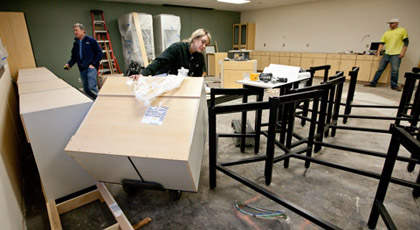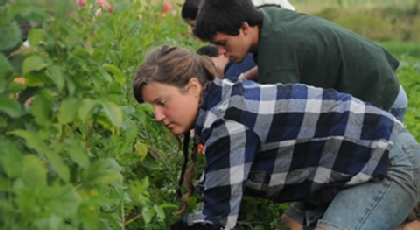Page 8 • (941 results in 0.027 seconds)
-
July 23, 2009 Biology professors win coveted Murdock grants Turning over barnacle-encrusted rocks, one by one, craning your neck to catch a glimpse of a bird or sloshing through a muddy tributary might not seem like hard core scientific endeavors. But think again. It’s research such as this that gleaned three assistant professors of biology – Michael Behrens, Julie Smith and Jacob Egge – grants totaling more than $120,000. The support, provided by the Vancouver, Wash. based M.J. Murdock
-
: Introductory Microbiology BIOL 205: Human Anatomy and Physiology I BIOL 206: Human Anatomy and Physiology II BIOL 225: Molecules, Cells, and Organisms BIOL 341: Developmental Biology BIOL 342: Microbiology BIOL 352: Comparative Anatomy BIOL 444: Neurobiology BIOL 448: Immunology BIOL 449: Virology BIOL 453: Mammalian Physiology Chemistry CHEM 105: Chemistry of Life CHEM 403: Biochemistry I CHEM 405: Biochemistry II Kinesiology KINS 277: Foundations of Kinesiology KINS 279: Teaching Physical Activity KINS
-
: BIOL 330: Genetics BIOL 341: Developmental Biology BIOL 342: Microbiology BIOL 352: Comparative Anatomy BIOL 357: Histology BIOL 442: Cell Biology BIOL 453: Mammalian Physiology Physics Courses PLU has two introductory physics series. Students interested in veterinary school should take the sequence that is required for their intended major. Students majoring in biology usually take the PHYS 125/126 series with accompanying labs, while those majoring in chemistry or physics must take the PHYS 153
-
: BIOL 330: Genetics BIOL 341: Developmental Biology BIOL 342: Microbiology BIOL 352: Comparative Anatomy BIOL 357: Histology BIOL 442: Cell Biology BIOL 453: Mammalian Physiology Physics Courses PLU has two introductory physics series. Students interested in veterinary school should take the sequence that is required for their intended major. Students majoring in biology usually take the PHYS 125/126 series with accompanying labs, while those majoring in chemistry or physics must take the PHYS 153
-

January 14, 2011 New biology lab an interactive plus for students By Barbara Clements The lab tucked in the north side of the Rieke Science Center is all about drywall, dust and stacks of cabinets right now. But come spring semester, the new Louis and Lydia Sheffels Biology Laboratory, otherwise known as Room #136, will open up to new work stations and new equipment. Louis and Lydia Sheffels Biology Laboratory will open up to new work stations and new equipment. (Photo by John Froschauer) The
-
courses: BIOL 225: Molecules, Cells and Organisms BIOL 226: Genes, Evolution, Diversity and Ecology Many programs require some of the upper level courses listed below in addition to general biology courses. Please verify with the specific programs you are interested in to be sure all requirements are met. BIOL 342: Microbiology BIOL 330: Genetics BIOL 341: Developmental Biology BIOL 352: Comparative Anatomy BIOL 357: Histology BIOL 442: Cell Biology BIOL 453: Mammalian Physiology Please make sure you
-
courses: BIOL 225: Molecules, Cells and Organisms BIOL 226: Genes, Evolution, Diversity and Ecology Many programs require some of the upper level courses listed below in addition to general biology courses. Please verify with the specific programs you are interested in to be sure all requirements are met. BIOL 342: Microbiology BIOL 330: Genetics BIOL 341: Developmental Biology BIOL 352: Comparative Anatomy BIOL 357: Histology BIOL 442: Cell Biology BIOL 453: Mammalian Physiology Please make sure you
-
addressed embryonic development and metamorphosis of Bombina orientalis (fire-bellied toad). He kept five or six of the charismatic little amphibians in his research lab until his retirement, hand-feeding them bits of liver. Carlson was known as the department’s developmental biologist, who regularly taught the upper-division course in the subject and routinely participated in the biology core, required by all majors. In 1996 he was awarded a National Science Foundation grant, along with colleagues
-

September 10, 2010 Best Foot Forward By Kari Plog ’11 When first-year students came to campus for orientation weekend this past September, organizers made sure that, on that first Saturday, those students were promptly sent off campus. About a dozen first-year students rolled up their sleeves and got muddy at Left Foot Organics, a non-profit farm which aims to promote self-sufficiency, inclusion and independence for people with developmental disabilities and rural youth. It was part of PLU’s On
-

Ami Shah Chair, Global Studies Phone: 253-535-7687 Email: shah@plu.edu Office Location: Hauge Administration Building - 222-C Professional Biography Additional Titles/Roles Associate Professor of Global Studies Education Ph.D., Developmental Studies, University of Oxford, 2007 M.Phil. with Distinction, Developmental Studies, University of Oxford, 2002 B.A., International Affairs, The George Washington University, 2000 Areas of Emphasis or Expertise International Development International
Area of Emphasis/Expertise
Do you have any feedback for us? If so, feel free to use our Feedback Form.


